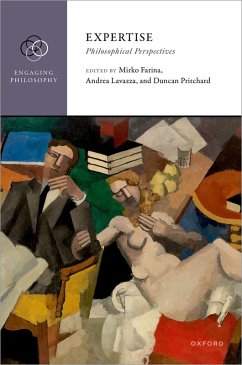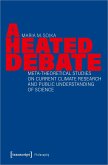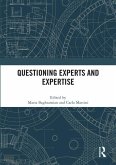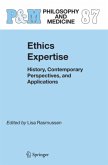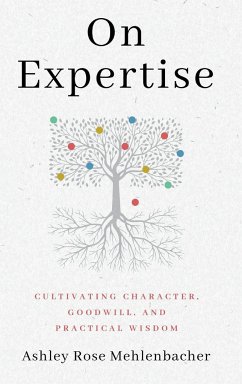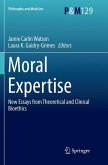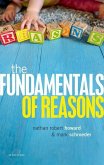Expertise
Philosophical Perspectives
Herausgeber: Farina, Mirko; Pritchard, Duncan; Lavazza, Andrea
Expertise
Philosophical Perspectives
Herausgeber: Farina, Mirko; Pritchard, Duncan; Lavazza, Andrea
- Gebundenes Buch
- Merkliste
- Auf die Merkliste
- Bewerten Bewerten
- Teilen
- Produkt teilen
- Produkterinnerung
- Produkterinnerung
This is a collective study of philosophical questions to do with experts and expertise, such as: What is an expert? Who decides who the experts are? Should we always defer to experts? How should expertise inform public policy? What happens when the experts disagree? Must experts be unbiased? Does it matter what the source of the expertise is?
Andere Kunden interessierten sich auch für
![A Heated Debate A Heated Debate]() Maria M. SojkaA Heated Debate36,99 €
Maria M. SojkaA Heated Debate36,99 €![Questioning Experts and Expertise Questioning Experts and Expertise]() Questioning Experts and Expertise180,99 €
Questioning Experts and Expertise180,99 €![Ethics Expertise Ethics Expertise]() Lisa Rasmussen (ed.)Ethics Expertise115,99 €
Lisa Rasmussen (ed.)Ethics Expertise115,99 €![On Expertise On Expertise]() Ashley Rose MehlenbacherOn Expertise140,99 €
Ashley Rose MehlenbacherOn Expertise140,99 €![Moral Expertise Moral Expertise]() Moral Expertise64,99 €
Moral Expertise64,99 €![Epistemic Injustice Epistemic Injustice]() Miranda FrickerEpistemic Injustice28,99 €
Miranda FrickerEpistemic Injustice28,99 €![The Fundamentals of Reasons The Fundamentals of Reasons]() Mark SchroederThe Fundamentals of Reasons110,99 €
Mark SchroederThe Fundamentals of Reasons110,99 €-
-
-
This is a collective study of philosophical questions to do with experts and expertise, such as: What is an expert? Who decides who the experts are? Should we always defer to experts? How should expertise inform public policy? What happens when the experts disagree? Must experts be unbiased? Does it matter what the source of the expertise is?
Hinweis: Dieser Artikel kann nur an eine deutsche Lieferadresse ausgeliefert werden.
Hinweis: Dieser Artikel kann nur an eine deutsche Lieferadresse ausgeliefert werden.
Produktdetails
- Produktdetails
- Verlag: Oxford University Press
- Seitenzahl: 304
- Erscheinungstermin: 6. September 2024
- Englisch
- Abmessung: 244mm x 165mm x 28mm
- Gewicht: 635g
- ISBN-13: 9780198877301
- ISBN-10: 0198877307
- Artikelnr.: 69876659
- Herstellerkennzeichnung
- Libri GmbH
- Europaallee 1
- 36244 Bad Hersfeld
- gpsr@libri.de
- Verlag: Oxford University Press
- Seitenzahl: 304
- Erscheinungstermin: 6. September 2024
- Englisch
- Abmessung: 244mm x 165mm x 28mm
- Gewicht: 635g
- ISBN-13: 9780198877301
- ISBN-10: 0198877307
- Artikelnr.: 69876659
- Herstellerkennzeichnung
- Libri GmbH
- Europaallee 1
- 36244 Bad Hersfeld
- gpsr@libri.de
Mirko Farina is a philosopher and a cognitive scientist. He is Professor of Philosophy and Computer Science and Head of Human Machine Interaction Lab at the Institute for Digital Economy and Artificial Systems, jointly established by Xiamen University and Lomonosov Moscow State University. Previously, he was Associate Professor of Philosophy and Computer Science at Innopolis University. Andrea Lavazza is a moral philosopher and a neuroethicist. He is senior research fellow at the Centro Universitario Internazionale, Arezzo, Italy, and adjunct professor in Neuroethics at the University of Milan and at the University of Pavia, Italy, where he also teaches Philosophy of Mind. His main interests are at the intersection among ethics, epistemology, cognitive science, and new technologies. Lavazza has published over 110 papers in peer-reviewed journals and a dozen books both in Italian and in English. Duncan Pritchard is UC Distinguished Professor of Philosophy and Director of the Center for Knowledge, Technology & Society at the University of California, Irvine. He was previously Professor of Philosophy and Director of the Eidyn research center at the University of Edinburgh. His monographs include Epistemic Luck (OUP, 2005), The Nature and Value of Knowledge (OUP, 2010), Epistemological Disjunctivism (OUP, 2012), Epistemic Angst: Radical Skepticism and the Groundlessness of Our Believing (Princeton University Press, 2015), and Scepticism: A Very Short Introduction (OUP, 2019). His academic distinctions include the award of the Philip Leverhulme Prize, election to a Fellowship of the Royal Society of Edinburgh, and delivering the annual Soochow Lectures in Philosophy.
* Part 1: Introduction
* 1: Duncan Pritchard, Mirko Farina, and Andrea Lavazza: Expertise
* Part 2: Expertise and Trust
* 2: Massimo Pigliucci: The Problem of Pseudoscience: Who Should We
Trust When it Comes to Fringe Beliefs?
* 3: Gloria Origgi: Authority, Legitimacy and the Expert-Layman Problem
* 4: Daniel DeNicola: Institutionalized Expertise: Trust, Rejection,
and Ignorance
* Part 3: Situated and Group Expertise
* 5: Lisa Bortolotti, Michael Larkin, and Michele Lim: Expertise as
Perspectives in Dialogue
* 6: John Sutton: Affective, Cognitive, and Ecological Components of
Joint Expertise in Collaborative Embodied Skills
* Part 4: Expertise and Public Policy
* 7: Rivkah Hatchwell and David Papineau: Expert Judgement Without
Values: Credences not Inductive Risks
* 8: Michela Massimi: From the Right to Science as an
Epistemic-Cultural Human Right to the Right to Expertise
* 9: Harry Collins: Studies of Expertise and Experience'
* Part 5: Expertise and Virtue
* 10: Linda Zagzebski: Humility for Experts
* 11: Andrea Lavazza and Mirko Farina: 1. Expertise-in-Action: The
Importance of Intellectual and Moral Virtue(s) to Experts' Epistemic
Authority'
* Part 6: Expertise About Value
* 12: Dominic McIver Lopes: Experts in Aesthetic Value Practices
* 13: Emma Gordon: Moral Expertise and Socratic AI
* Part 7: New Directions
* 14: Veli Mitova: Decolonising Experts
* 15: Duncan Pritchard: Public Expertise and Ignorance
* 1: Duncan Pritchard, Mirko Farina, and Andrea Lavazza: Expertise
* Part 2: Expertise and Trust
* 2: Massimo Pigliucci: The Problem of Pseudoscience: Who Should We
Trust When it Comes to Fringe Beliefs?
* 3: Gloria Origgi: Authority, Legitimacy and the Expert-Layman Problem
* 4: Daniel DeNicola: Institutionalized Expertise: Trust, Rejection,
and Ignorance
* Part 3: Situated and Group Expertise
* 5: Lisa Bortolotti, Michael Larkin, and Michele Lim: Expertise as
Perspectives in Dialogue
* 6: John Sutton: Affective, Cognitive, and Ecological Components of
Joint Expertise in Collaborative Embodied Skills
* Part 4: Expertise and Public Policy
* 7: Rivkah Hatchwell and David Papineau: Expert Judgement Without
Values: Credences not Inductive Risks
* 8: Michela Massimi: From the Right to Science as an
Epistemic-Cultural Human Right to the Right to Expertise
* 9: Harry Collins: Studies of Expertise and Experience'
* Part 5: Expertise and Virtue
* 10: Linda Zagzebski: Humility for Experts
* 11: Andrea Lavazza and Mirko Farina: 1. Expertise-in-Action: The
Importance of Intellectual and Moral Virtue(s) to Experts' Epistemic
Authority'
* Part 6: Expertise About Value
* 12: Dominic McIver Lopes: Experts in Aesthetic Value Practices
* 13: Emma Gordon: Moral Expertise and Socratic AI
* Part 7: New Directions
* 14: Veli Mitova: Decolonising Experts
* 15: Duncan Pritchard: Public Expertise and Ignorance
* Part 1: Introduction
* 1: Duncan Pritchard, Mirko Farina, and Andrea Lavazza: Expertise
* Part 2: Expertise and Trust
* 2: Massimo Pigliucci: The Problem of Pseudoscience: Who Should We
Trust When it Comes to Fringe Beliefs?
* 3: Gloria Origgi: Authority, Legitimacy and the Expert-Layman Problem
* 4: Daniel DeNicola: Institutionalized Expertise: Trust, Rejection,
and Ignorance
* Part 3: Situated and Group Expertise
* 5: Lisa Bortolotti, Michael Larkin, and Michele Lim: Expertise as
Perspectives in Dialogue
* 6: John Sutton: Affective, Cognitive, and Ecological Components of
Joint Expertise in Collaborative Embodied Skills
* Part 4: Expertise and Public Policy
* 7: Rivkah Hatchwell and David Papineau: Expert Judgement Without
Values: Credences not Inductive Risks
* 8: Michela Massimi: From the Right to Science as an
Epistemic-Cultural Human Right to the Right to Expertise
* 9: Harry Collins: Studies of Expertise and Experience'
* Part 5: Expertise and Virtue
* 10: Linda Zagzebski: Humility for Experts
* 11: Andrea Lavazza and Mirko Farina: 1. Expertise-in-Action: The
Importance of Intellectual and Moral Virtue(s) to Experts' Epistemic
Authority'
* Part 6: Expertise About Value
* 12: Dominic McIver Lopes: Experts in Aesthetic Value Practices
* 13: Emma Gordon: Moral Expertise and Socratic AI
* Part 7: New Directions
* 14: Veli Mitova: Decolonising Experts
* 15: Duncan Pritchard: Public Expertise and Ignorance
* 1: Duncan Pritchard, Mirko Farina, and Andrea Lavazza: Expertise
* Part 2: Expertise and Trust
* 2: Massimo Pigliucci: The Problem of Pseudoscience: Who Should We
Trust When it Comes to Fringe Beliefs?
* 3: Gloria Origgi: Authority, Legitimacy and the Expert-Layman Problem
* 4: Daniel DeNicola: Institutionalized Expertise: Trust, Rejection,
and Ignorance
* Part 3: Situated and Group Expertise
* 5: Lisa Bortolotti, Michael Larkin, and Michele Lim: Expertise as
Perspectives in Dialogue
* 6: John Sutton: Affective, Cognitive, and Ecological Components of
Joint Expertise in Collaborative Embodied Skills
* Part 4: Expertise and Public Policy
* 7: Rivkah Hatchwell and David Papineau: Expert Judgement Without
Values: Credences not Inductive Risks
* 8: Michela Massimi: From the Right to Science as an
Epistemic-Cultural Human Right to the Right to Expertise
* 9: Harry Collins: Studies of Expertise and Experience'
* Part 5: Expertise and Virtue
* 10: Linda Zagzebski: Humility for Experts
* 11: Andrea Lavazza and Mirko Farina: 1. Expertise-in-Action: The
Importance of Intellectual and Moral Virtue(s) to Experts' Epistemic
Authority'
* Part 6: Expertise About Value
* 12: Dominic McIver Lopes: Experts in Aesthetic Value Practices
* 13: Emma Gordon: Moral Expertise and Socratic AI
* Part 7: New Directions
* 14: Veli Mitova: Decolonising Experts
* 15: Duncan Pritchard: Public Expertise and Ignorance

